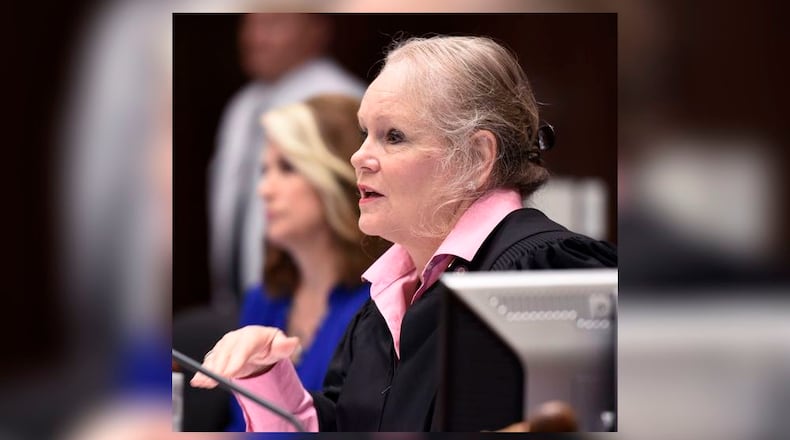Campbell joined the national board in 2018 ― she was appointed by the NAMI Ohio board of directors, of which she is also the current president ― because she wants diversion for people who shouldn’t be in the criminal justice system.
“Now, I’m a big believer of holding people accountable for their behavior, so this isn’t a soft on crime position,” she said. “It’s smart on crime. We need prisons. Sadly, there are people in this world that deserve to be in jail and prison. That’s where they belong, where they can’t hurt other people. But we shouldn’t be using our jails and prisons as mental health institutions, and that’s where we stand right now.”
About a year after she became Fairfield’s judge, the murder case of Sophal Prom, a Vietnam native eventually convicted in Butler County Common Pleas Court of killing a co-worker in 2000, came before Campbell. That same week, a flyer on a program about therapeutic jurisprudence came across her desk. That serendipitous moment started a judicial mission in helping those who commit crimes because of their mental illness.
That wasn’t Prom’s first time facing a judge, Campbell said. She had a Campbell said Prom “had clearly been traumatized by her experience in Vietnam” and was found not guilty by reason of insanity years earlier for aggravated menacing, a first-degree misdemeanor, in Hamilton Municipal Court.
“When she was charged with this homicide, I thought, ‘There’s something wrong in this picture that we have someone that’s been in the justice system before, but no one kept tabs on her. No one made sure she got the treatment she needed,’” Campbell said. “No one made sure that she wasn’t acting out on violent tendencies.”
Campbell did her research, visiting other mental health courts out of state and then assembled area stakeholders from the sheriff’s office and police department to service providers and the Butler County NAMI to figure out how to help those who are mentally ill that commit crimes.
“We borrowed from other courts across the country because, at the time, there weren’t any in Ohio. We had a SAMI (Substance Abuse Mental Illness) Court up in (Butler County) Common Pleas, but it was not quite the same,” she said.
By the end of 2000, the Treatment Alternative Court, or TAC, was created, and she and her staff adjusted the program as they went along.
“I believe with every fiber of my being that we need to have a mental health court docket in every jurisdiction across the country,” Campbell said. “Our prisons and our jails have become the largest mental health facility. Being mentally ill should not be criminalized, and that’s not to say that people with a mental health diagnosis can’t be criminals. I’m not saying that. But for those people whose criminal acts are a proximate and direct result of their mental illness, they’re not criminals, and they should not be treated in the same way as criminals. This is an alternate way of doing it, and quite frankly get them out of the system and get them from being frequent flyers.”
In most cases, the criminal acts committed by people due to their mental illness are low misdemeanors, the judge said. They’re often charges like criminal trespass, theft, public intoxication, and other non-violent crimes. But even though they can start out very minor, they can escalate if there isn’t a way to intervene and “make sure they get the help they need,” she said.
Over her two-plus-decade effort to address mental health in the courts, Campbell believes she and others around the state have “moved the needle” as there are now hundreds mental health dockets across Ohio. Though, she said, judges that don’t have specialized dockets need to be educated on mental health issues.
Former Ohio Supreme Court Justice Eve Stratton has been “the biggest champion” for mental and behavioral health courts, and making the state a leader in this area, said Campbell.
“We have been incredibly progressive in diverting people from the criminal justice system that shouldn’t be there, and the biggest champion for all of this has been former justice Eve Stratton,” said Campbell, saying the former justice made Fairfield’s TAC docket possible.
After her time leading the NAMI national board, Campbell said it’s her hope “that we make significant end roads in establishing crisis intervention teams, crisis centers, and establishing mental health court dockets throughout the country.”
About the Author

